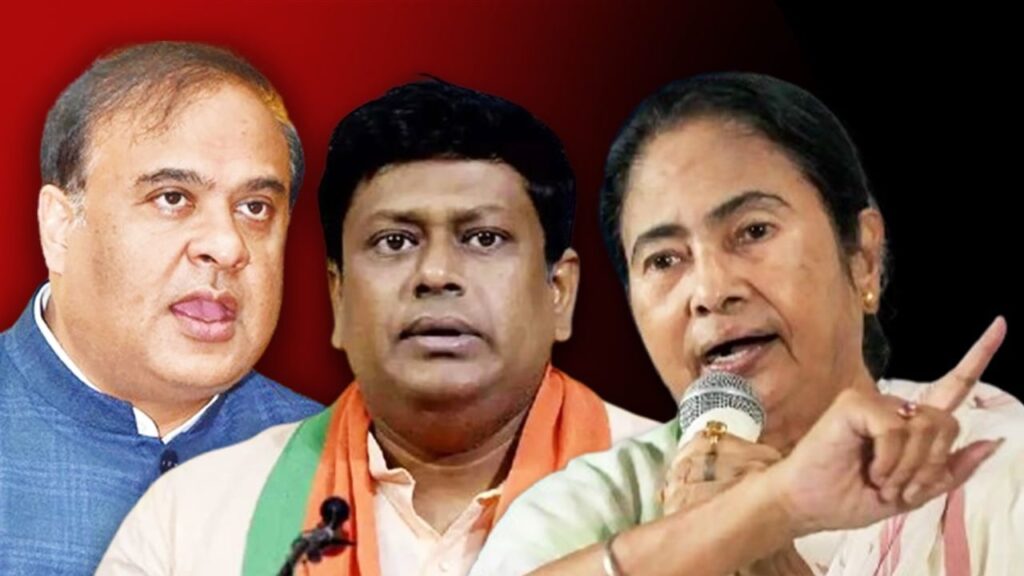In the wake of the horrific rape and murder of a trainee doctor at RG Kar Medical College in Kolkata, political tensions in West Bengal have escalated, spilling over into Assam and Delhi. On Wednesday, Chief Minister Mamata Banerjee unleashed a barrage of criticism against the BJP during the Trinamool Congress (TMC) Student Council’s foundation day celebrations, accusing the party of inciting violence in Bengal. She warned, “If Bengal burns, then Assam, the Northeast, Bihar, Jharkhand, Uttar Pradesh, Odisha, and Delhi will also catch fire.”
The Political Firestorm
Mamata Banerjee’s comments come in response to the 12-hour shutdown called by the BJP, which descended into chaos across various parts of Bengal. TMC supporters clashed with BJP party workers and police, leading to widespread unrest.
Direct Attacks from Assam’s Chief Minister
In a pointed rebuttal, Assam Chief Minister Himanta Biswa Sarma criticized Banerjee for what he described as her brazen threats against Assam. Sarma remarked, “Didi (sister), how dare you threaten Assam? Do not try to intimidate us. Your failed politics should not attempt to set India ablaze, and your divisive language is unbecoming of your position.”
দিদি, আপনার এতো সাহস কীভাবে হলো যে আপনি অসমকে ধমকি দিচ্ছেন? আমাদের রক্তচক্ষু দেখাবেন না। আপনার অসফলতার pic.twitter.com/k194lajS8s
— Himanta Biswa Sarma (@himantabiswa) August 28, 2024
Mamata’s Reaction to Recent Violence and Protests
Speaking at the TMC student wing’s anniversary event, Mamata denounced the shutdown and subsequent protests, drawing comparisons to protests occurring in Bangladesh. She extolled the cultural connection Bengal shares with the neighboring nation but clarified that Bangladesh remains a separate country.
Mamata is already facing intense scrutiny and widespread protests regarding the state’s handling of the violent incident involving the medical intern. Her declaration that “what needs to be done, will be done” implies a shift towards more assertive political rhetoric, which has raised alarms among her critics.
Opposition’s Response to Mamata’s Statements
In an official letter to Union Home Minister Amit Shah, Sukanta Mazumdar, president of the BJP’s Bengal unit, labeled Banerjee’s statements as “anti-national.” He condemned her threats as inflammatory and stated that such language is inappropriate for someone in her position of authority. He urged immediate resignation, asserting that her rhetoric endangers the safety and integrity of the state.
Statements from Central Leadership
Central Minister Giriraj Singh joined the chorus of criticism, condemning Mamata Banerjee as a “tyrant” reminiscent of Kim Jong-un. He accused her administration of resorting to violence against protesters while simultaneously blaming the BJP, expressing that her government represents the epitome of lawlessness.
The Wider Implications for Governance
This ongoing political drama underscores broader concerns regarding governance in Bengal. As tension escalates, the call for unity and the promotion of peace must come from all corners of the political spectrum. The citizens of West Bengal are watching closely, and the ramifications of these political maneuvers could shape the region’s future stability.
Conclusion
The clash between the TMC and BJP highlights the intricate relationship between politics and societal unrest in India. As Mamata Banerjee and political opponents trade barbs, the hope for resolution through dialogue and diplomacy must take precedence to ensure peace and democracy prevail in the region.
